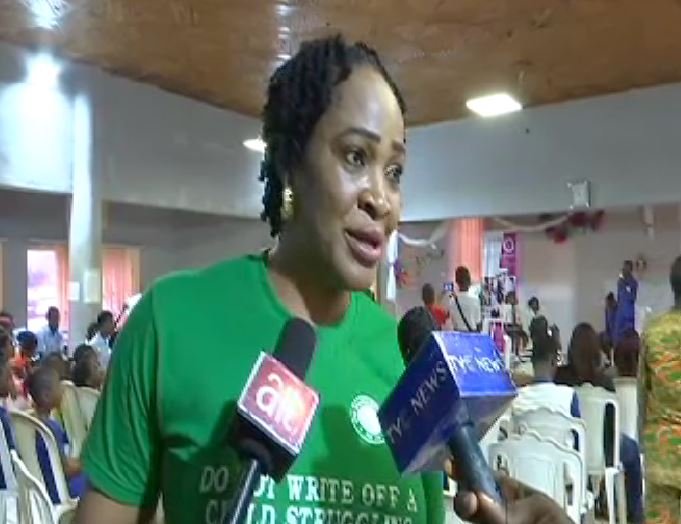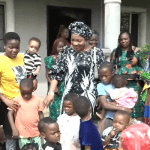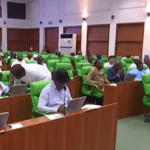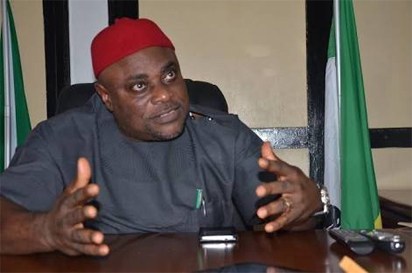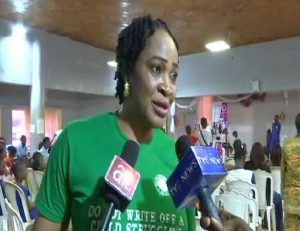
A support and advocacy initiative for children with special needs has charged the federal government to put policies in place to make the recently passed disability bill implementable.
The group made this call at a programme for children with special needs in Abuja.
Special needs is a catch-all phrase which refers to a vast array of diagnoses or disabilities among children.
Children with special needs are born with either a syndrome, a terminal illness, or profound cognitive impairment.
Other children may have special needs that involve struggling with learning disabilities, food allergies developmental delays or panic attacks.
More than 1 billion people or 15% of the world population have a disability.
The world Disability Report estimates that there are between 93 and 150 million disabled children aged under 14years. The prevalence for moderate and severe disability on this age cohort in Africa is 6.4%.
One of the challenges faced by caregivers and teachers of these children is the inability for them to write and read fluently.
Genetic disorders, pre and perinatal problems such as birth trauma, injuries and accidents are the main contributors to childhood impairment.
On 23rd January 2019, president Muhammad Buhari signed into law the disabilities prohibition Act.
This bill prohibits all forms of discrimination against persons with disabilities.If an individual is found violating this law, he or she will pay a fine of N100,000 or a term of 6 months imprisonment, it also imposes a fine of 1 million Naira on corporate bodies.
Group ask FG to put policies in place to protect children with special needs
A support and advocacy initiative for children with special needs has charged the federal government to put policies in place to make the recently passed disability bill implementable.
The group made this call at a programme for children with special needs in Abuja.
Special needs is a catch-all phrase which refers to a vast array of diagnoses or disabilities among children.
Children with special needs are born with either a syndrome, a terminal illness, or profound cognitive impairment.
Other children may have special needs that involve struggling with learning disabilities, food allergies developmental delays or panic attacks.
More than 1 billion people or 15% of the world population have a disability.
The world Disability Report estimates that there are between 93 and 150 million disabled children aged under 14years. The prevalence for moderate and severe disability on this age cohort in Africa is 6.4%.
One of the challenges faced by caregivers and teachers of these children is the inability for them to write and read fluently.
Genetic disorders, pre and perinatal problems such as birth trauma, injuries and accidents are the main contributors to childhood impairment.
On 23rd January 2019, president Muhammad Buhari signed into law the disabilities prohibition Act.
This bill prohibits all forms of discrimination against persons with disabilities.If an individual is found violating this law, he or she will pay a fine of N100,000 or a term of 6 months imprisonment, it also imposes a fine of 1 million Naira on corporate bodies.

A support and advocacy initiative for children with special needs has charged the federal government to put policies in place to make the recently passed disability bill implementable.
The group made this call at a programme for children with special needs in Abuja.
Special needs is a catch-all phrase which refers to a vast array of diagnoses or disabilities among children.
Children with special needs are born with either a syndrome, a terminal illness, or profound cognitive impairment.
Other children may have special needs that involve struggling with learning disabilities, food allergies developmental delays or panic attacks.
More than 1 billion people or 15% of the world population have a disability.
The world Disability Report estimates that there are between 93 and 150 million disabled children aged under 14years. The prevalence for moderate and severe disability on this age cohort in Africa is 6.4%.
One of the challenges faced by caregivers and teachers of these children is the inability for them to write and read fluently.
Genetic disorders, pre and perinatal problems such as birth trauma, injuries and accidents are the main contributors to childhood impairment.
On 23rd January 2019, president Muhammad Buhari signed into law the disabilities prohibition Act.
This bill prohibits all forms of discrimination against persons with disabilities.If an individual is found violating this law, he or she will pay a fine of N100,000 or a term of 6 months imprisonment, it also imposes a fine of 1 million Naira on corporate bodies.
Group ask FG to put policies in place to protect children with special needs
A support and advocacy initiative for children with special needs has charged the federal government to put policies in place to make the recently passed disability bill implementable.
The group made this call at a programme for children with special needs in Abuja.
Special needs is a catch-all phrase which refers to a vast array of diagnoses or disabilities among children.
Children with special needs are born with either a syndrome, a terminal illness, or profound cognitive impairment.
Other children may have special needs that involve struggling with learning disabilities, food allergies developmental delays or panic attacks.
More than 1 billion people or 15% of the world population have a disability.
The world Disability Report estimates that there are between 93 and 150 million disabled children aged under 14years. The prevalence for moderate and severe disability on this age cohort in Africa is 6.4%.
One of the challenges faced by caregivers and teachers of these children is the inability for them to write and read fluently.
Genetic disorders, pre and perinatal problems such as birth trauma, injuries and accidents are the main contributors to childhood impairment.
On 23rd January 2019, president Muhammad Buhari signed into law the disabilities prohibition Act.
This bill prohibits all forms of discrimination against persons with disabilities.If an individual is found violating this law, he or she will pay a fine of N100,000 or a term of 6 months imprisonment, it also imposes a fine of 1 million Naira on corporate bodies.

A support and advocacy initiative for children with special needs has charged the federal government to put policies in place to make the recently passed disability bill implementable.
The group made this call at a programme for children with special needs in Abuja.
Special needs is a catch-all phrase which refers to a vast array of diagnoses or disabilities among children.
Children with special needs are born with either a syndrome, a terminal illness, or profound cognitive impairment.
Other children may have special needs that involve struggling with learning disabilities, food allergies developmental delays or panic attacks.
More than 1 billion people or 15% of the world population have a disability.
The world Disability Report estimates that there are between 93 and 150 million disabled children aged under 14years. The prevalence for moderate and severe disability on this age cohort in Africa is 6.4%.
One of the challenges faced by caregivers and teachers of these children is the inability for them to write and read fluently.
Genetic disorders, pre and perinatal problems such as birth trauma, injuries and accidents are the main contributors to childhood impairment.
On 23rd January 2019, president Muhammad Buhari signed into law the disabilities prohibition Act.
This bill prohibits all forms of discrimination against persons with disabilities.If an individual is found violating this law, he or she will pay a fine of N100,000 or a term of 6 months imprisonment, it also imposes a fine of 1 million Naira on corporate bodies.
Group ask FG to put policies in place to protect children with special needs
A support and advocacy initiative for children with special needs has charged the federal government to put policies in place to make the recently passed disability bill implementable.
The group made this call at a programme for children with special needs in Abuja.
Special needs is a catch-all phrase which refers to a vast array of diagnoses or disabilities among children.
Children with special needs are born with either a syndrome, a terminal illness, or profound cognitive impairment.
Other children may have special needs that involve struggling with learning disabilities, food allergies developmental delays or panic attacks.
More than 1 billion people or 15% of the world population have a disability.
The world Disability Report estimates that there are between 93 and 150 million disabled children aged under 14years. The prevalence for moderate and severe disability on this age cohort in Africa is 6.4%.
One of the challenges faced by caregivers and teachers of these children is the inability for them to write and read fluently.
Genetic disorders, pre and perinatal problems such as birth trauma, injuries and accidents are the main contributors to childhood impairment.
On 23rd January 2019, president Muhammad Buhari signed into law the disabilities prohibition Act.
This bill prohibits all forms of discrimination against persons with disabilities.If an individual is found violating this law, he or she will pay a fine of N100,000 or a term of 6 months imprisonment, it also imposes a fine of 1 million Naira on corporate bodies.

A support and advocacy initiative for children with special needs has charged the federal government to put policies in place to make the recently passed disability bill implementable.
The group made this call at a programme for children with special needs in Abuja.
Special needs is a catch-all phrase which refers to a vast array of diagnoses or disabilities among children.
Children with special needs are born with either a syndrome, a terminal illness, or profound cognitive impairment.
Other children may have special needs that involve struggling with learning disabilities, food allergies developmental delays or panic attacks.
More than 1 billion people or 15% of the world population have a disability.
The world Disability Report estimates that there are between 93 and 150 million disabled children aged under 14years. The prevalence for moderate and severe disability on this age cohort in Africa is 6.4%.
One of the challenges faced by caregivers and teachers of these children is the inability for them to write and read fluently.
Genetic disorders, pre and perinatal problems such as birth trauma, injuries and accidents are the main contributors to childhood impairment.
On 23rd January 2019, president Muhammad Buhari signed into law the disabilities prohibition Act.
This bill prohibits all forms of discrimination against persons with disabilities.If an individual is found violating this law, he or she will pay a fine of N100,000 or a term of 6 months imprisonment, it also imposes a fine of 1 million Naira on corporate bodies.
Group ask FG to put policies in place to protect children with special needs
A support and advocacy initiative for children with special needs has charged the federal government to put policies in place to make the recently passed disability bill implementable.
The group made this call at a programme for children with special needs in Abuja.
Special needs is a catch-all phrase which refers to a vast array of diagnoses or disabilities among children.
Children with special needs are born with either a syndrome, a terminal illness, or profound cognitive impairment.
Other children may have special needs that involve struggling with learning disabilities, food allergies developmental delays or panic attacks.
More than 1 billion people or 15% of the world population have a disability.
The world Disability Report estimates that there are between 93 and 150 million disabled children aged under 14years. The prevalence for moderate and severe disability on this age cohort in Africa is 6.4%.
One of the challenges faced by caregivers and teachers of these children is the inability for them to write and read fluently.
Genetic disorders, pre and perinatal problems such as birth trauma, injuries and accidents are the main contributors to childhood impairment.
On 23rd January 2019, president Muhammad Buhari signed into law the disabilities prohibition Act.
This bill prohibits all forms of discrimination against persons with disabilities.If an individual is found violating this law, he or she will pay a fine of N100,000 or a term of 6 months imprisonment, it also imposes a fine of 1 million Naira on corporate bodies.

A support and advocacy initiative for children with special needs has charged the federal government to put policies in place to make the recently passed disability bill implementable.
The group made this call at a programme for children with special needs in Abuja.
Special needs is a catch-all phrase which refers to a vast array of diagnoses or disabilities among children.
Children with special needs are born with either a syndrome, a terminal illness, or profound cognitive impairment.
Other children may have special needs that involve struggling with learning disabilities, food allergies developmental delays or panic attacks.
More than 1 billion people or 15% of the world population have a disability.
The world Disability Report estimates that there are between 93 and 150 million disabled children aged under 14years. The prevalence for moderate and severe disability on this age cohort in Africa is 6.4%.
One of the challenges faced by caregivers and teachers of these children is the inability for them to write and read fluently.
Genetic disorders, pre and perinatal problems such as birth trauma, injuries and accidents are the main contributors to childhood impairment.
On 23rd January 2019, president Muhammad Buhari signed into law the disabilities prohibition Act.
This bill prohibits all forms of discrimination against persons with disabilities.If an individual is found violating this law, he or she will pay a fine of N100,000 or a term of 6 months imprisonment, it also imposes a fine of 1 million Naira on corporate bodies.
Group ask FG to put policies in place to protect children with special needs
A support and advocacy initiative for children with special needs has charged the federal government to put policies in place to make the recently passed disability bill implementable.
The group made this call at a programme for children with special needs in Abuja.
Special needs is a catch-all phrase which refers to a vast array of diagnoses or disabilities among children.
Children with special needs are born with either a syndrome, a terminal illness, or profound cognitive impairment.
Other children may have special needs that involve struggling with learning disabilities, food allergies developmental delays or panic attacks.
More than 1 billion people or 15% of the world population have a disability.
The world Disability Report estimates that there are between 93 and 150 million disabled children aged under 14years. The prevalence for moderate and severe disability on this age cohort in Africa is 6.4%.
One of the challenges faced by caregivers and teachers of these children is the inability for them to write and read fluently.
Genetic disorders, pre and perinatal problems such as birth trauma, injuries and accidents are the main contributors to childhood impairment.
On 23rd January 2019, president Muhammad Buhari signed into law the disabilities prohibition Act.
This bill prohibits all forms of discrimination against persons with disabilities.If an individual is found violating this law, he or she will pay a fine of N100,000 or a term of 6 months imprisonment, it also imposes a fine of 1 million Naira on corporate bodies.

A support and advocacy initiative for children with special needs has charged the federal government to put policies in place to make the recently passed disability bill implementable.
The group made this call at a programme for children with special needs in Abuja.
Special needs is a catch-all phrase which refers to a vast array of diagnoses or disabilities among children.
Children with special needs are born with either a syndrome, a terminal illness, or profound cognitive impairment.
Other children may have special needs that involve struggling with learning disabilities, food allergies developmental delays or panic attacks.
More than 1 billion people or 15% of the world population have a disability.
The world Disability Report estimates that there are between 93 and 150 million disabled children aged under 14years. The prevalence for moderate and severe disability on this age cohort in Africa is 6.4%.
One of the challenges faced by caregivers and teachers of these children is the inability for them to write and read fluently.
Genetic disorders, pre and perinatal problems such as birth trauma, injuries and accidents are the main contributors to childhood impairment.
On 23rd January 2019, president Muhammad Buhari signed into law the disabilities prohibition Act.
This bill prohibits all forms of discrimination against persons with disabilities.If an individual is found violating this law, he or she will pay a fine of N100,000 or a term of 6 months imprisonment, it also imposes a fine of 1 million Naira on corporate bodies.
Group ask FG to put policies in place to protect children with special needs
A support and advocacy initiative for children with special needs has charged the federal government to put policies in place to make the recently passed disability bill implementable.
The group made this call at a programme for children with special needs in Abuja.
Special needs is a catch-all phrase which refers to a vast array of diagnoses or disabilities among children.
Children with special needs are born with either a syndrome, a terminal illness, or profound cognitive impairment.
Other children may have special needs that involve struggling with learning disabilities, food allergies developmental delays or panic attacks.
More than 1 billion people or 15% of the world population have a disability.
The world Disability Report estimates that there are between 93 and 150 million disabled children aged under 14years. The prevalence for moderate and severe disability on this age cohort in Africa is 6.4%.
One of the challenges faced by caregivers and teachers of these children is the inability for them to write and read fluently.
Genetic disorders, pre and perinatal problems such as birth trauma, injuries and accidents are the main contributors to childhood impairment.
On 23rd January 2019, president Muhammad Buhari signed into law the disabilities prohibition Act.
This bill prohibits all forms of discrimination against persons with disabilities.If an individual is found violating this law, he or she will pay a fine of N100,000 or a term of 6 months imprisonment, it also imposes a fine of 1 million Naira on corporate bodies.

A support and advocacy initiative for children with special needs has charged the federal government to put policies in place to make the recently passed disability bill implementable.
The group made this call at a programme for children with special needs in Abuja.
Special needs is a catch-all phrase which refers to a vast array of diagnoses or disabilities among children.
Children with special needs are born with either a syndrome, a terminal illness, or profound cognitive impairment.
Other children may have special needs that involve struggling with learning disabilities, food allergies developmental delays or panic attacks.
More than 1 billion people or 15% of the world population have a disability.
The world Disability Report estimates that there are between 93 and 150 million disabled children aged under 14years. The prevalence for moderate and severe disability on this age cohort in Africa is 6.4%.
One of the challenges faced by caregivers and teachers of these children is the inability for them to write and read fluently.
Genetic disorders, pre and perinatal problems such as birth trauma, injuries and accidents are the main contributors to childhood impairment.
On 23rd January 2019, president Muhammad Buhari signed into law the disabilities prohibition Act.
This bill prohibits all forms of discrimination against persons with disabilities.If an individual is found violating this law, he or she will pay a fine of N100,000 or a term of 6 months imprisonment, it also imposes a fine of 1 million Naira on corporate bodies.
Group ask FG to put policies in place to protect children with special needs
A support and advocacy initiative for children with special needs has charged the federal government to put policies in place to make the recently passed disability bill implementable.
The group made this call at a programme for children with special needs in Abuja.
Special needs is a catch-all phrase which refers to a vast array of diagnoses or disabilities among children.
Children with special needs are born with either a syndrome, a terminal illness, or profound cognitive impairment.
Other children may have special needs that involve struggling with learning disabilities, food allergies developmental delays or panic attacks.
More than 1 billion people or 15% of the world population have a disability.
The world Disability Report estimates that there are between 93 and 150 million disabled children aged under 14years. The prevalence for moderate and severe disability on this age cohort in Africa is 6.4%.
One of the challenges faced by caregivers and teachers of these children is the inability for them to write and read fluently.
Genetic disorders, pre and perinatal problems such as birth trauma, injuries and accidents are the main contributors to childhood impairment.
On 23rd January 2019, president Muhammad Buhari signed into law the disabilities prohibition Act.
This bill prohibits all forms of discrimination against persons with disabilities.If an individual is found violating this law, he or she will pay a fine of N100,000 or a term of 6 months imprisonment, it also imposes a fine of 1 million Naira on corporate bodies.

A support and advocacy initiative for children with special needs has charged the federal government to put policies in place to make the recently passed disability bill implementable.
The group made this call at a programme for children with special needs in Abuja.
Special needs is a catch-all phrase which refers to a vast array of diagnoses or disabilities among children.
Children with special needs are born with either a syndrome, a terminal illness, or profound cognitive impairment.
Other children may have special needs that involve struggling with learning disabilities, food allergies developmental delays or panic attacks.
More than 1 billion people or 15% of the world population have a disability.
The world Disability Report estimates that there are between 93 and 150 million disabled children aged under 14years. The prevalence for moderate and severe disability on this age cohort in Africa is 6.4%.
One of the challenges faced by caregivers and teachers of these children is the inability for them to write and read fluently.
Genetic disorders, pre and perinatal problems such as birth trauma, injuries and accidents are the main contributors to childhood impairment.
On 23rd January 2019, president Muhammad Buhari signed into law the disabilities prohibition Act.
This bill prohibits all forms of discrimination against persons with disabilities.If an individual is found violating this law, he or she will pay a fine of N100,000 or a term of 6 months imprisonment, it also imposes a fine of 1 million Naira on corporate bodies.
Group ask FG to put policies in place to protect children with special needs
A support and advocacy initiative for children with special needs has charged the federal government to put policies in place to make the recently passed disability bill implementable.
The group made this call at a programme for children with special needs in Abuja.
Special needs is a catch-all phrase which refers to a vast array of diagnoses or disabilities among children.
Children with special needs are born with either a syndrome, a terminal illness, or profound cognitive impairment.
Other children may have special needs that involve struggling with learning disabilities, food allergies developmental delays or panic attacks.
More than 1 billion people or 15% of the world population have a disability.
The world Disability Report estimates that there are between 93 and 150 million disabled children aged under 14years. The prevalence for moderate and severe disability on this age cohort in Africa is 6.4%.
One of the challenges faced by caregivers and teachers of these children is the inability for them to write and read fluently.
Genetic disorders, pre and perinatal problems such as birth trauma, injuries and accidents are the main contributors to childhood impairment.
On 23rd January 2019, president Muhammad Buhari signed into law the disabilities prohibition Act.
This bill prohibits all forms of discrimination against persons with disabilities.If an individual is found violating this law, he or she will pay a fine of N100,000 or a term of 6 months imprisonment, it also imposes a fine of 1 million Naira on corporate bodies.

